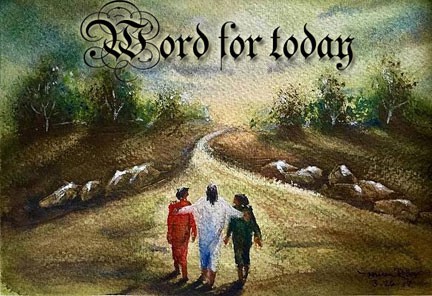Watch
Events
Articles
Market
More
Please pray for us. I have a big vision with lots of cogs to the wheel of it. I am a senior and need some young hands on deck and who so ever will hands on deck to help facilitate and move things forward.
*Dry Salt Day Spa & Wellness Business which is Shabbath Meeting Venue as well. In need of scriptural holistic aesthetician, scriptural holistic massage therapist, marketer with tech, book keeping, ministry event planning, Ketubah Wedding Planning. Must be willing to travel on occasion. One right hand gal with these qualifications would be terrific.
*Ministry Specifics<> worship tech, videography, musicians for worship team.
*Ranch hand <> Young single strong man that can be my husbands right hand guy to do many diy projects to develope 55 acre ranch, landing runway, aviation projects, property development for scriptural feasts in two states. Must be willing to travel on occasion.
Can provide living quarters for qualified individuals. Looking for those willing to grow with us so blessings can increase for all.
Shalom




Please pray for us. I have a big vision with lots of cogs to the wheel of it. I am a senior and need some young hands on deck and who so ever will hands on deck to help facilitate and move things forward.
*Dry Salt Day Spa & Wellness Business which is Shabbath Meeting Venue as well. In need of scriptural holistic aesthetician, scriptural holistic massage therapist, marketer with tech, book keeping, ministry event planning, Ketubah Wedding Planning. Must be willing to travel on occasion. One right hand gal with these qualifications would be terrific.
*Ministry Specifics<> worship tech, videography, musicians for worship team.
*Ranch hand <> Young single strong man that can be my husbands right hand guy to do many diy projects to develope 55 acre ranch, landing runway, aviation projects, property development for scriptural feasts in two states. Must be willing to travel on occasion.
Can provide living quarters for qualified individuals. Looking for those willing to grow with us so blessings can increase for all.
Shalom




Please pray for us. I have a big vision with lots of cogs to the wheel of it. I am a senior and need some young hands on deck and who so ever will hands on deck to help facilitate and move things forward.
*Dry Salt Day Spa & Wellness Business which is Shabbath Meeting Venue as well. In need of scriptural holistic aesthetician, scriptural holistic massage therapist, marketer with tech, book keeping, ministry event planning, Ketubah Wedding Planning. Must be willing to travel on occasion. One right hand gal with these qualifications would be terrific.
*Ministry Specifics<> worship tech, videography, musicians for worship team.
*Ranch hand <> Young single strong man that can be my husbands right hand guy to do many diy projects to develope 55 acre ranch, landing runway, aviation projects, property development for scriptural feasts in two states. Must be willing to travel on occasion.
Can provide living quarters for qualified individuals. Looking for those willing to grow with us so blessings can increase for all.
Shalom




Please pray for us. I have a big vision with lots of cogs to the wheel of it. I am a senior and need some young hands on deck and who so ever will hands on deck to help facilitate and move things forward.
*Dry Salt Day Spa & Wellness Business which is Shabbath Meeting Venue as well. In need of scriptural holistic aesthetician, scriptural holistic massage therapist, marketer with tech, book keeping, ministry event planning, Ketubah Wedding Planning. Must be willing to travel on occasion. One right hand gal with these qualifications would be terrific.
*Ministry Specifics<> worship tech, videography, musicians for worship team.
*Ranch hand <> Young single strong man that can be my husbands right hand guy to do many diy projects to develope 55 acre ranch, landing runway, aviation projects, property development for scriptural feasts in two states. Must be willing to travel on occasion.
Can provide living quarters for qualified individuals. Looking for those willing to grow with us so blessings can increase for all.
Shalom




Please pray for us. I have a big vision with lots of cogs to the wheel of it. I am a senior and need some young hands on deck and who so ever will hands on deck to help facilitate and move things forward.
*Dry Salt Day Spa & Wellness Business which is Shabbath Meeting Venue as well. In need of scriptural holistic aesthetician, scriptural holistic massage therapist, marketer with tech, book keeping, ministry event planning, Ketubah Wedding Planning. Must be willing to travel on occasion. One right hand gal with these qualifications would be terrific.
*Ministry Specifics<> worship tech, videography, musicians for worship team.
*Ranch hand <> Young single strong man that can be my husbands right hand guy to do many diy projects to develope 55 acre ranch, landing runway, aviation projects, property development for scriptural feasts in two states. Must be willing to travel on occasion.
Can provide living quarters for qualified individuals. Looking for those willing to grow with us so blessings can increase for all.
Shalom




 +10
+10



012725
WORD FOR TODAY “the power of HIS hands”: Exo 9:15 By now I could have stretched out my hand and struck you and your people with such severe plagues that you would have been wiped off the earth.
WISDOM FOR TODAY: Pro 17:3 The refining pot is for silver and the furnace for gold, But the LORD tests hearts.
www.BGMCTV.org




Nice. Great sound and Truth. I love that it kind of reminds me of the sound of Yes from the 70’s. I’m old lol
*New Song*
https://youtube.com/shorts/jkk....5wC6rekk?feature=sha
Holy, Holy, Holy Yah
By Dr Garth Grenache
and his Uncanny Valley Orchestra
2025:1:12
Holy, holy, holy Yah,
Our Father God Almighty
Who was, who is, and yet shall come,
The Father of eternity!
To Yah who sits upon His throne,
And to thy Son Yeshu alone
Be blessing, honor, glory's might,
Resounding through eonic light



One of the reasons why I bought the Halleluyah Scriptures Complete Edition is because some of my Torah friends in Yeshua recognize the extra books as Scriptures such as the Apocrypha, Enoch, Jubilees and Jasher. The Scriptures that Yeshua and the Apostles used is a Greek translation called the Septuagint. It contained the Old Testament and the Apocrypha. Even if you don't recognize them as Scripture, it still has useful historical information. Thoughts?



This audio podcast which is a little over 26 minutes shows verses in the Bible where the words God/Elohim refer to human beings of high rank such as prophet, judge and king. This doesn't make them equal to Yehovah, but is done when a person represents Yehovah. This is also the reason why I no longer believe that Yeshua is God/Elohim but a human being that represented Yehovah.
For those who still believe that Yeshua is God/Elohim, that's okay because it means that Yeshua represented Yehovah very well!


